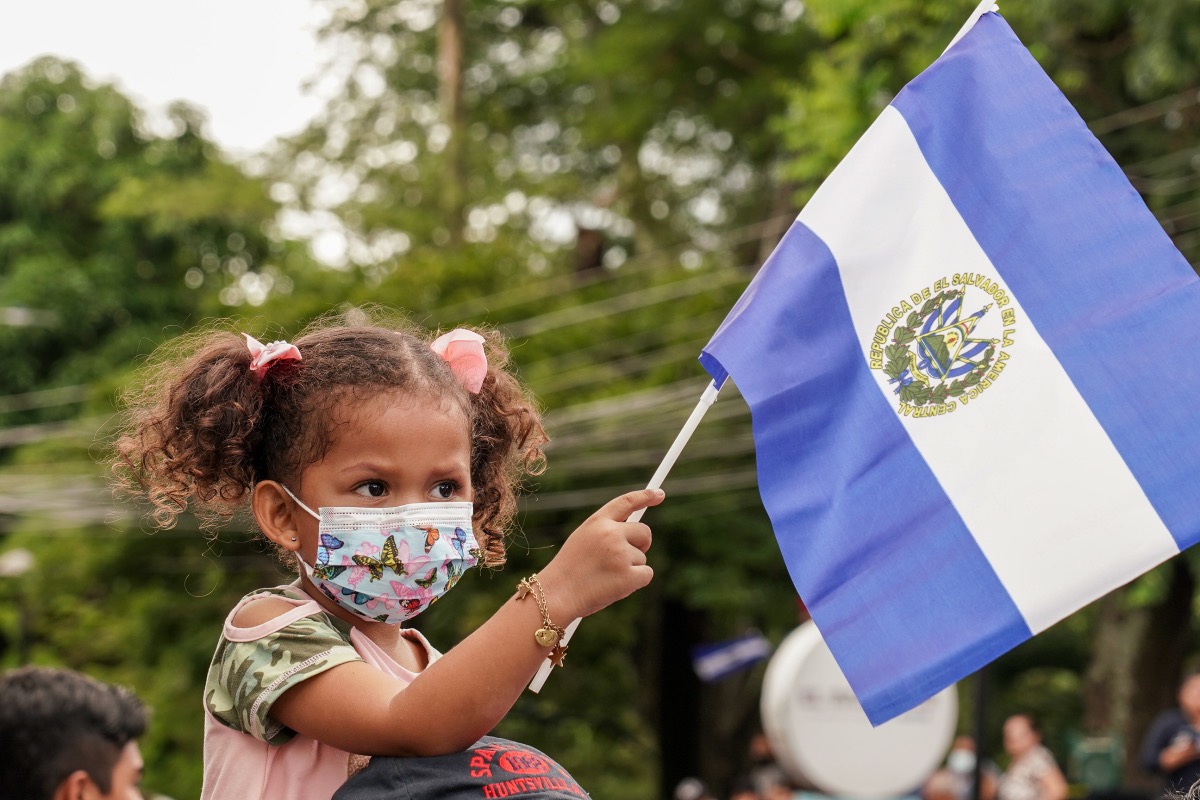

A little girl waves the Salvadoran flag as she waits for the military parade in celebration of El Salvador’s Independence Day, September 15, 2022. (Francisco Lozano/Latino Rebels)
SAN SALVADOR, El Salvador — On Thursday, El Salvador’s Independence Day, President Nayib Bukele announced that he will seek re-election when his five-year term ends in 2024, defying a constitutional ban on consecutive re-election.
“Advanced countries of the world have reelections, and today, El Salvador has it too,” Bukele during a televised address to the nation Thursday night.
#Breaking: Salvadoran President Nayib Bukele has just announced he will seek re-election in 2024, a move explicitly prohibited by the Salvadoran constitution. pic.twitter.com/DZsw1Ff3zv
— El Faro English (@elfaroenglish) September 16, 2022
Bukele was joined by his wife, the president of the Supreme Court, and the attorney general.
Last year the Constitutional Chamber of the Supreme Court — whose justices were appointed by a Bukele-controlled Congress — ordered the Supreme Electoral Court to allow consecutive re-election.
Following Thursday’s announcement, people immediately took to Twitter to voice their opposition.
“The announcement that Bukele made today, beyond illegal, is a proselytizing act, therefore he shouldn’t have done it on a national broadcast from the Presidential House and with State funds,” wrote journalist Edwin Segura. “Thus starts his road to re-election: with illegalities, and use and abuse of public resources.”
“The constitution doesn’t allow the same person to be president twice in a row. They can be president 80 times, if they’d like, but not in a row,” President Bukele said himself in a 2013 television interview.
A Celebration Amid Protest
As officials prepared to conduct a military parade for Independence Day, just around the corner, anti-government groups and activists marched, bringing thousands of Salvadorans to protest against President Bukele and his policies — among them, his controversial “State of Exception” in March, which suspended civil rights for the sake of combating gang violence and control.
#ElSalvador It's Independence Day, instead of celebrating; people will be demonstrating against president #bukele "Exeption Regime" that targets gang, but allows arbitrary detentions without due process. Bukele is seeking to change the constitution to be re-elected @latinorebels pic.twitter.com/0TDII07WIL
— Francisco Lozano (@FrancisLozano7) September 15, 2022
In mid-August, the congress approved another monthlong extension to the emergency measures, which were initially temporary.
Critics claim that such measures ave thrown innocent people in jail without due process, with 50,000 people jailed since March. Dozens have died in jail, some showing signs of torture.
Iconic #bukele's opposition activist @LadyDragES speaks of what is to come as democracy is under fire. "The Exception Regime has been extended (after 5 months)" #elsalvador marchs against president #bukele on Independence Day. @latinorebels @HectorLuisAlamo #El15Marchamos pic.twitter.com/k1ypmtgW1A
— Francisco Lozano (@FrancisLozano7) September 15, 2022
While Salvadorans welcome the decreased violence and crime brought by State of Exemption, many fear that it is has gone too far, with weary to mothers fear for their sons. El Faro obtained classified documents that show that people were arrested just because “they got nervous in the presence of the police.”
“What is the route? To get that son of a b—h out!” chanted protesters as they marched through San Salvador’s Central Market, appealing to the working class.
#elsalvador The march against president #bukele, on Independence Day approaches the Plaza Libertad. #El15Marchamos @latinorebels @HectorLuisAlamo pic.twitter.com/iw3epQarMe
— Francisco Lozano (@FrancisLozano7) September 15, 2022
“I know that you believed his (Bukele’s) promises, but the same one that made you promises is the one that has removed your goods, prohibiting street vending!” one activist yelled through a megaphone.
To many older Salvadorans, the marches are reminiscent of the 1980s, when government repression sparked a civil war that lasted more than 12 years.
A red sea at Plaza Libertad as #fmln takes part in an all inclusive march against president Bukele's policies, among them, the #regimendeexcepcion and Bukele's looming reelection, which is unconstitutional on Independence Day. #el15marchamos @latinorebels @HectorLuisAlamo pic.twitter.com/NDVLSjWw7T
— Francisco Lozano (@FrancisLozano7) September 15, 2022
Thursday’s demonstrations were largely peaceful, however. There was no military presence, with the exception of several military helicopters that flew overhead at least twice.
Meanwhile, reports on Twitter showed images of military checkpoints, especially in the department of La Libertad. Activists believe the checkpoints are to prevent people from the inner cities to join the march.
#ElSalvador | Retén zona de El Poliedro. La Libertad. Se informa que está instalado desde las 3 a.m. Video EDH/ N. Ángel pic.twitter.com/BSOZKnuvZs
— elsalvador.com (@elsalvadorcom) September 15, 2022
“These frisk and search checkpoints remind us of what it was like in 1979 when we would go to protest at the capital. By 1981, we were in a full war due to the repressions,” explained one protester who requested to remain anonymous.
“I’m in favor of combating violence and gangs, corruption, political corruption. But we are living through a regression in our country,” said Medardo Gonzáles, leader of the Farabundo Martí National Liberation Front, which began as a left-wing guerilla group in 1980 but converted to a political party after the Chapultepec Peace Accords were signed in 1992, ending the armed conflict.
“People are waking up — you can see by the numbers in the march,” said a taxi driver. “I’m afraid it might be too late, he (Bukele) has all the power now.”
***
Francisco Lozano is a freelance photographer and writer based in Los Angeles and has covered extensively the migrants and asylum seekers at the Mexican border. Twitter: @FrancisLozano7



[…] post Thousands March in El Salvador as Bukele Plans to Run for Re-election appeared first on Latino […]
[…] Source link […]